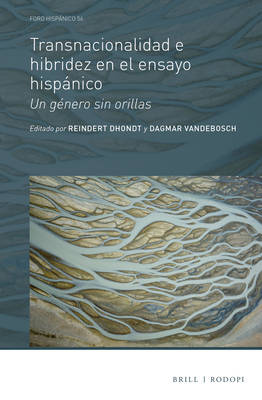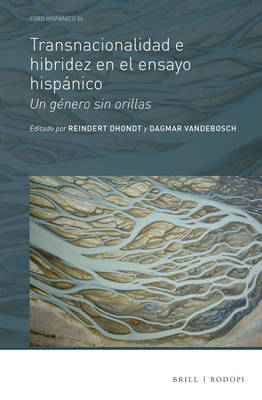
- Afhalen na 1 uur in een winkel met voorraad
- Gratis thuislevering in België vanaf € 30
- Ruim aanbod met 7 miljoen producten
- Afhalen na 1 uur in een winkel met voorraad
- Gratis thuislevering in België vanaf € 30
- Ruim aanbod met 7 miljoen producten
Zoeken
Transnacionalidad E Hibridez En El Ensayo Hispánico
Un Género Sin Orillas
€ 210,95
+ 421 punten
Omschrijving
Transnacionalidad e hibridez en el ensayo hispánico. Un género sin orillas examines how the essay, a privileged genre for the articulation of national identities in Latin America and Spain for decades, is being reconfigured in the present age of globalisation and transnationalisation. The articles included in this volume pay particular attention to the discursive forms and the practices of publishing that question old national categories, without disregarding their relevance.
Starting from some theoretical considerations about the contemporary Latin American essay, the book concentrates especially on three dimensions of transnationalising the essay: the experience of exile, the tensions between the national and the transnational in the redefinition of Hispanic identities, and its relation with the genre's formal hybridisation, in the work of authors such as Bolaño, Piglia and Vila-Matas.
Transnacionalidad e hibridez en el ensayo hispánico. Un género sin orillas estudia cómo el ensayo, que durante décadas ofreció un foro privilegiado a la articulación de identidades nacionales en Latinoamérica y España, se está reconfigurando en una era de globalización y transnacionalización. Este volumen dedica atención especial a las formas discursivas y los modos de publicación que ponen en entredicho las antiguas categorías nacionales, sin descartar la relevancia de éstas.
Partiendo de unas reflexiones más teóricas sobre el ensayo latinoamericano contemporáneo, el libro se centra en tres dimensiones de transnacionalización, a saber, la experiencia del exilio, las tensiones entre lo nacional y lo transnacional en la redefinición de identidades hispánicas, y la relación con la hibridación formal del género. Se estudian obras de autores como Bolaño, Piglia y Vila-Matas.
Starting from some theoretical considerations about the contemporary Latin American essay, the book concentrates especially on three dimensions of transnationalising the essay: the experience of exile, the tensions between the national and the transnational in the redefinition of Hispanic identities, and its relation with the genre's formal hybridisation, in the work of authors such as Bolaño, Piglia and Vila-Matas.
Transnacionalidad e hibridez en el ensayo hispánico. Un género sin orillas estudia cómo el ensayo, que durante décadas ofreció un foro privilegiado a la articulación de identidades nacionales en Latinoamérica y España, se está reconfigurando en una era de globalización y transnacionalización. Este volumen dedica atención especial a las formas discursivas y los modos de publicación que ponen en entredicho las antiguas categorías nacionales, sin descartar la relevancia de éstas.
Partiendo de unas reflexiones más teóricas sobre el ensayo latinoamericano contemporáneo, el libro se centra en tres dimensiones de transnacionalización, a saber, la experiencia del exilio, las tensiones entre lo nacional y lo transnacional en la redefinición de identidades hispánicas, y la relación con la hibridación formal del género. Se estudian obras de autores como Bolaño, Piglia y Vila-Matas.
Specificaties
Betrokkenen
- Uitgeverij:
Inhoud
- Aantal bladzijden:
- 290
- Taal:
- Spaans
- Reeks:
- Reeksnummer:
- nr. 56
Eigenschappen
- Productcode (EAN):
- 9789004330474
- Verschijningsdatum:
- 10/11/2016
- Uitvoering:
- Hardcover
- Formaat:
- Genaaid
- Afmetingen:
- 163 mm x 236 mm
- Gewicht:
- 544 g

Alleen bij Standaard Boekhandel
+ 421 punten op je klantenkaart van Standaard Boekhandel
Beoordelingen
We publiceren alleen reviews die voldoen aan de voorwaarden voor reviews. Bekijk onze voorwaarden voor reviews.










